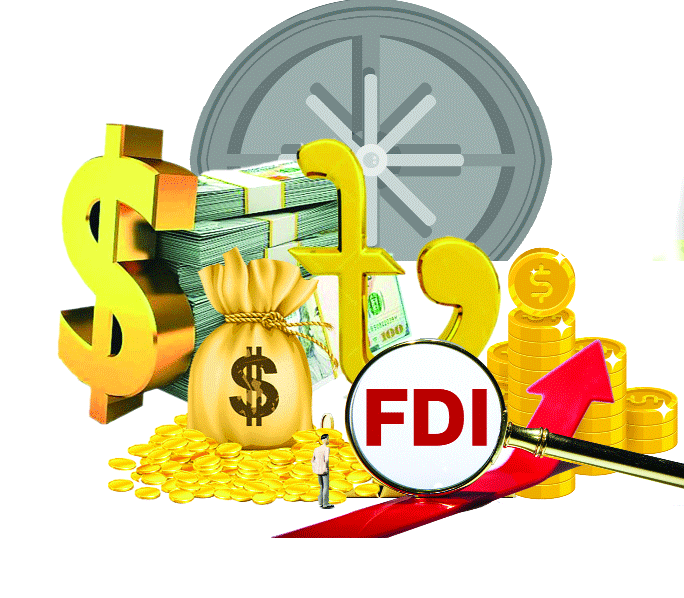Less FDI inflow creates pressure on reserve
FDI decreased by 7.11 pc
Mahfuz Emran: One of the sources of foreign exchange is foreign direct investment or FDI. The ongoing dollar crisis in the country could not give any good news in this sector. On the other hand, foreign direct investment (FDI) fell by more than 7 percent in the outgoing fiscal year. This information was found in the latest report on FDI of Bangladesh Bank.
Experts say that foreign investment naturally declines in the year before elections. Among them, foreign investors do not get confidence due to economic and dollar crisis, shortfall in electricity and fuel supply and uncontrolled price increase, rapid exchange rate changes etc. Besides, lagging behind in ease of doing business index, lack of coordination among regulatory agencies, lack of information, lack of skilled workers, foreigners are not coming forward to invest large capital in this country due to various reasons.
According to the report of Bangladesh Bank, in the fiscal year 2022-23, the net FDI inflow into the country is about $3.195 billion. In FY 2021-22, net FDI inflows are around $3.440 billion. That is, the FDI inflow decreased by 7.11 percent last financial year. Although in the previous financial year 2021-22, net FDI increased by a record 37.22 percent. Because in 2020-21 financial year FDI comes to $2.507 billion. And in the fiscal year 2019-20, FDI came to the country at $2.370 billion.
According to sources, foreign investment has been negatively affected since the pandemic corona hit the country. However, as the outbreak of Corona subsided, foreign investment increased continuously in the financial years 2020-21 and 2021-22. However, in the outgoing financial year 2022-23, this index has stumbled. This has also affected the country’s foreign exchange reserves.
In addition to falling FDI inflows, new capital and equity investment also came in low last fiscal year. According to the report, foreigners have invested about $796 million as capital (equity) in the outgoing financial year. This is 40.91 percent less than its previous fiscal year. Equity investment came in at $1.347 billion in fiscal year 2021-22.
Although the amount of foreign reinvestment increased by 15.93 percent last fiscal year. During this period, $2.37 billion came as reinvestment. It was $2.045 billion for the fiscal year 2021-22. And last fiscal year, about $29 million came as intra-company loans. The previous fiscal year that amount was about $48 million.
Generally, foreign companies invest in three ways. These are as new capital, reinvestment of profits earned from existing businesses, and borrowing by one company from another, known as intra-company loans. The report also shows that in 2022-23 UK entrepreneurs made the highest investment in Bangladesh. During this period, about $565 million of investment came from the UK, which was $56 million in the financial year 2021-22. The second highest investment of $43.5 million came from the Netherlands. In the financial year 2021-22, the investment from the country was $303 million. $29.52 million came from Korea, which was $31.29 million in the previous fiscal year. The United States is fourth with an investment of $289.1 million. In the financial year 2021-22, the investment from the country is $35.41million. In addition, foreign investment of $192 million came from Singapore, $184 million from Norway, $183.8 million from Hong Kong, $17 million from Malta, $119.8 million from India and $99.5 million from Malaysia.
Meanwhile, the highest foreign investment in the last financial year was in the textile sector, amounting to $662.2 million. In the fiscal year 2021-22, the amount of foreign investment in this sector was $705.6 million. Next is the telecommunication sector. In the financial year 2022-23, foreign investment in this sector was $43.43 million, which was $51.16 million in the previous financial year. The third highest amount of $36.45 million came from the banking sector, which was $31.99 million in the financial year 2021-22. The gas and petroleum sector received $32.56 million, which was $34.32 million in the fiscal year 2021-22. Besides, $30 million in electricity sector, $265 million in food sector, $12.11 billion in leather and leather products sector, $7.95 million in chemical and pharmaceutical sector, $7.61 millionin construction sector and $6.97 million in fertilizer sector. Foreign investment in dollars has come.
According to the data, FDI in the country’s economic zones in the outgoing financial year was only $4.16 million and $406.46 million in EPZ. And net foreign investment in other areas outside the EPZ and economic zones was $2.785 billion.
It should be noted that the Institute of Chartered Accountants of Bangladesh (ICAB) organized a webinar last month on the current status and prospects of FDI in Bangladesh. Khandkar Golam Moazzem, research director of the private research institute Center for Policy Dialogue (CPD), said that the amount of foreign investment has decreased a lot in recent years. On the other hand, foreign investment is increasing in neighboring countries including India. But in the current reality of the country, foreign investment is much needed. At present, the amount of capital investment by foreigners has decreased a lot. The main reason for this is that foreigners are now not getting confidence in new investments. It is possible to increase FDI only by investigating the reasons why this is happening and taking necessary measures.
President Joe Biden tests positive for COVID-19 while campaigning in Las Vegas, has ‘mild symptoms’
International Desk: President Joe Biden tested positive for COVID-19 while traveling Wedne…








